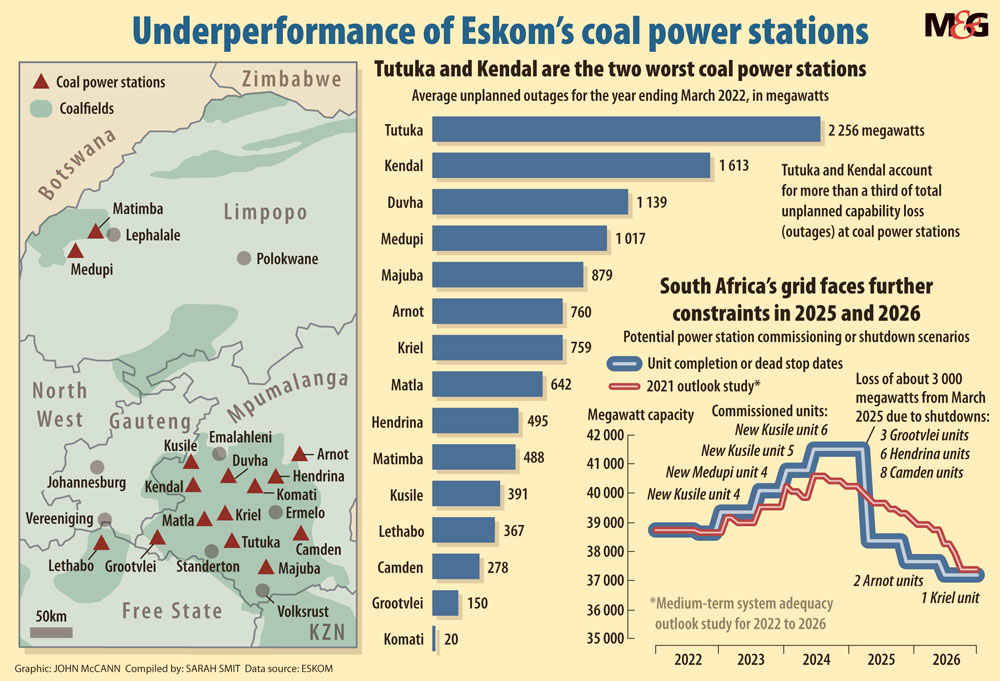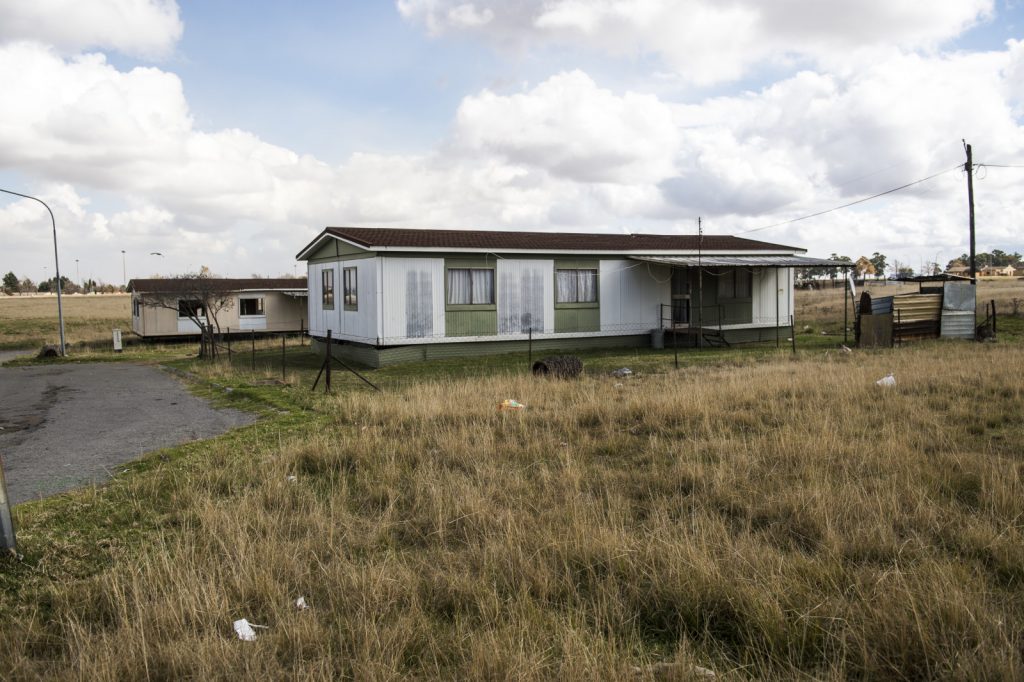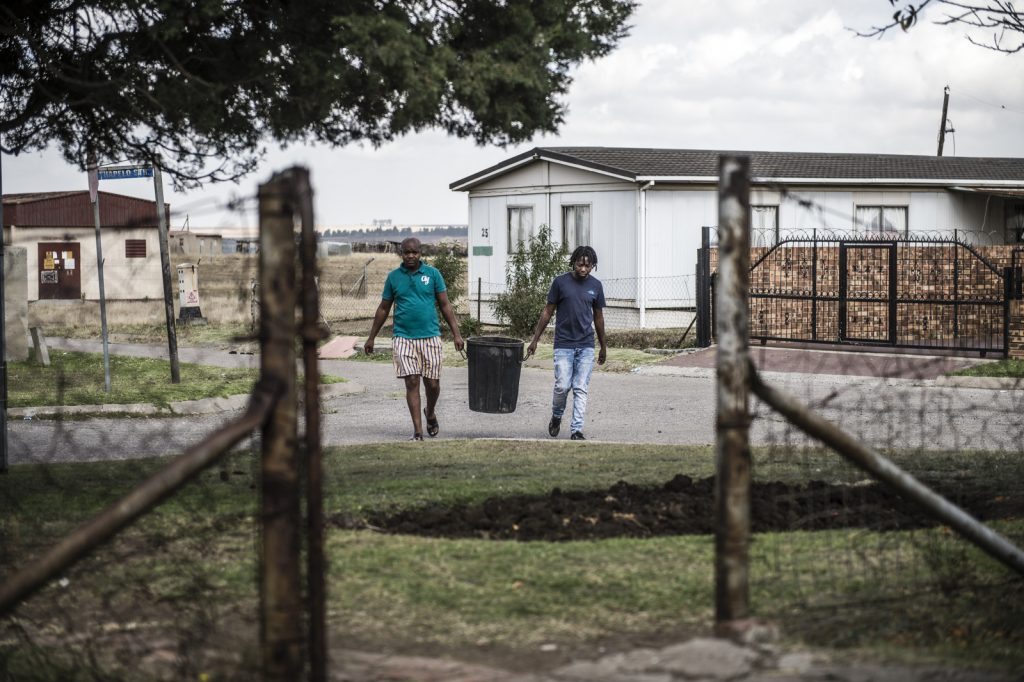Tutuka Powerstation Standerton - Photos: Delwyn Verasamy
Goats and cows feed on rubbish in a waste skip in Thuthukani, about 8km down the road from the Tutuka power station, Eskom’s worst-performing station.
The town, 28km from Standerton in Mpumalanga, was established in the mid-1980s for Eskom employees and their families when the power plant was built. Residents who have lived there for more than 30 years say living standards in the area have declined.
The state entity’s most recent state of the system briefing detailed how Tutuka experienced the highest number of unplanned power failures between January and March this year, recording an average loss per day of 2 256 megawatts during that period.
Eskom’s report stated that Tutuka was the main culprit for trips in 2021, which was also the worst year of load-shedding nationally on record — 511 trips or about 43 a month.
Tutuka; Medupi, near Lephalale in Limpopo; Duvha, about 24km from eMalahleni in Mpumalanga; and Kriel near the town of the same name and also in Mpumalanga accounted for about 51% of those trips.
Eskom blamed the degradation of Tutuka on fraud and corruption, adding that the problems besetting the plant were “complex”.

“In addition to sabotage and theft, many years of running the plant exceptionally hard [including a period of two-shifting where the units are shut down and started up daily, which puts more stress on the systems and components] while less than ideal maintenance and upgrades were executed due to funding and capacity constraints. In addition, there are skills and human performance issues,” Eskom said.
The Mail & Guardian reported last week that a forensic report commissioned by Tutuka’s management had unearthed corruption and sabotage allegedly perpetrated by Eskom employees so that companies close to senior officials would get repeat business.
Eskom, through spokesperson Sikonathi Mantshantsha, said the head office could not comment on what action had been taken stemming from the report beyond that the plant’s manager had been suspended. He added that the acting manager had not seen the report.
‘Thuthukani was clean and beautiful’
The M&G spent time with the residents of Thuthukani, and heard of how a once “beautiful” town had degenerated.
Mampho*, 48, said her family moved to Thuthukani in 1988 when her father started working at the power station, first working as a general worker, before becoming an artisan.
“This place used to be clean and beautiful, almost as if we were staying in the suburbs. Eskom and its employees were responsible for the upkeep of the community, including cutting grass, sweeping the streets and collecting household trash every day. “When they would collect the trash, they would leave a refuse bag,” Mampho said.
“You know, we used to have sports and recreational facilities, such as tennis courts and football fields. There used to be a lot of sporting activities, but all of that is in the past now.”
Mampho said she started seeing the decline in the town in the late 1990s into the early 2000s, when much of the services that Eskom provided were outsourced to contracted companies.
“Everything started being outsourced, including the scholar transport, which used to be provided by Eskom, but was then given to external operators. Even the trash collection is now done by contractors.
“Once the external providers began handling our services, there was a rapid deterioration in our area, including what is now the normal occurrence of us having our water cut, which never happened until the early 2000s.”
Skip bins overflowing with garbage dotted around the town, which animals raid when they are herded through the area. None of the residents the M&G spoke to could remember the last time their refuse had been collected.

No load-shedding in Thuthukani
But Zandile*, a security officer at the power plant, said Thuthukani did not experience the rolling power cuts that have afflicted the rest of the country since 2008.
“If there are any outages scheduled, we are informed by Eskom in advance that the power will be cut for the period of time announced. The power cuts are usually only a few hours when Eskom needs to do some maintenance on our electricity supply, before it returns again. But, to be honest, we don’t struggle at all with power outages in our area,” Zandile said.
When the M&G visited Zandile, she was harvesting vegetables in her garden. They included carrots, butternut and beetroot.
There is a budding subsistence agricultural economy in Thuthukani, including a vegetable garden, sponsored by the Mpumalanga cooperative governance and traditional affairs department, which supplies fresh produce to the local school and crèche. What is left over is sent to the market or shared among the small-holder farmers.
The farmers, all Thuthukani residents, complained about the unstable water supply as a hindrance not only to their projects, but also to their standard of living.
Despite residents complaining about a lack of waste collection, Eskom’s Mantshantsha said this week that Eskom provided a weekly refuse removal service to Thuthukani, but that livestock remained “a challenge because of the animals” ate from the bins, which results in “uncontrolled spillage of waste”.

“In an effort to curtail the uncontrolled access by animals, Eskom is in the process of deploying closed bins. A monthly meeting is convened with [the] Thuthukani councillor to address matters in relation to the township, including the resolving of matters as and when it occurs,” Mantshantsha said.
He added that Eskom and the local councillor had initiated a programme in January to promote “cleanliness within the community”.
On whether Eskom worked with the Lekwa local municipality to improve service provision in Thuthukani, Mantshantsha said the power utility was in the process of handing over Thuthukani to the municipality and that discussions were ongoing to ensure this “is done in a structured fashion”.
“While the progress of this handover process is satisfactory, it is envisaged that the conclusion of the handover should be achieved by December 2022.”
[/membership]